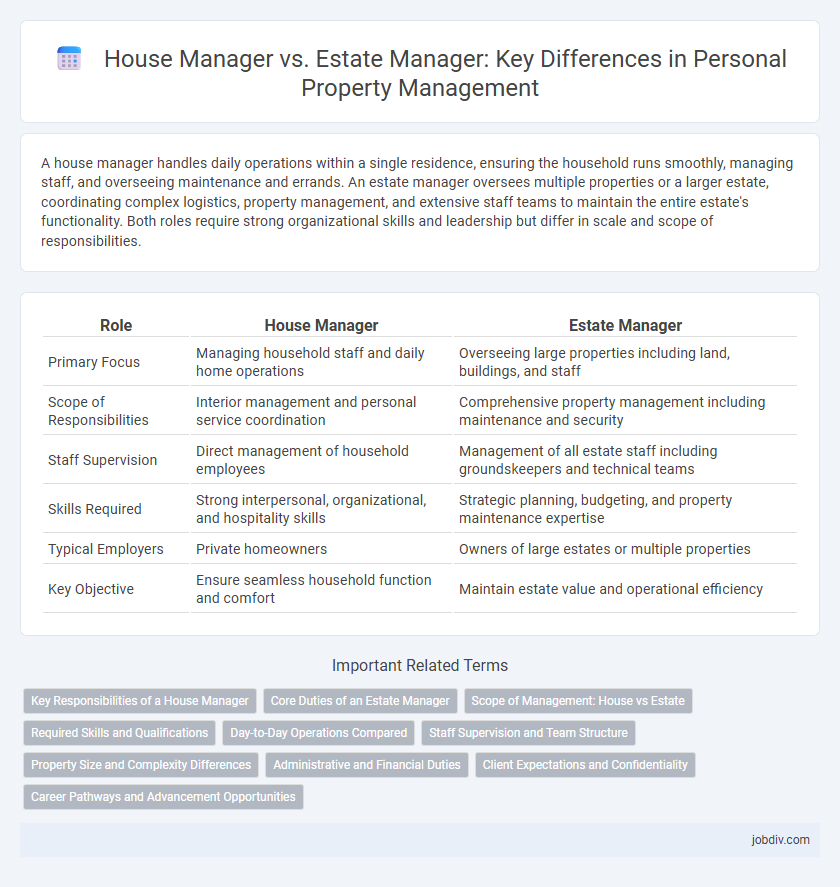A house manager handles daily operations within a single residence, ensuring the household runs smoothly, managing staff, and overseeing maintenance and errands. An estate manager oversees multiple properties or a larger estate, coordinating complex logistics, property management, and extensive staff teams to maintain the entire estate's functionality. Both roles require strong organizational skills and leadership but differ in scale and scope of responsibilities.
Table of Comparison
| Role | House Manager | Estate Manager |
|---|---|---|
| Primary Focus | Managing household staff and daily home operations | Overseeing large properties including land, buildings, and staff |
| Scope of Responsibilities | Interior management and personal service coordination | Comprehensive property management including maintenance and security |
| Staff Supervision | Direct management of household employees | Management of all estate staff including groundskeepers and technical teams |
| Skills Required | Strong interpersonal, organizational, and hospitality skills | Strategic planning, budgeting, and property maintenance expertise |
| Typical Employers | Private homeowners | Owners of large estates or multiple properties |
| Key Objective | Ensure seamless household function and comfort | Maintain estate value and operational efficiency |
Key Responsibilities of a House Manager
A House Manager oversees daily household operations, including supervising domestic staff, managing schedules, and maintaining inventory of household supplies. They ensure the home environment is organized, clean, and running smoothly, handling logistics such as coordinating maintenance and vendor services. Key responsibilities emphasize hands-on management, guest coordination, and addressing immediate household needs to enhance the homeowner's comfort and convenience.
Core Duties of an Estate Manager
An Estate Manager oversees the comprehensive management of large residential properties, coordinating maintenance, staff, security, and financial planning to ensure seamless operation and preservation of the estate's value. Core duties include supervising household staff, managing vendor contracts, budgeting for property expenses, and overseeing renovations or landscaping projects to maintain high standards. Their role extends beyond daily household tasks, emphasizing strategic planning, asset management, and protecting the estate's long-term interests.
Scope of Management: House vs Estate
A House Manager oversees the day-to-day operations and maintenance of a single residence, ensuring smooth household functioning and managing staff within the home. In contrast, an Estate Manager handles a broader scope, including multiple properties, grounds, and possibly agricultural or recreational facilities, coordinating extensive staff teams and managing large-scale budgets. The estate scope encompasses infrastructure, security, and vendor relations beyond the immediate household, requiring strategic oversight and resource allocation.
Required Skills and Qualifications
House Managers require strong organizational skills, attention to detail, and proficiency in household staff supervision and daily operations management. Estate Managers demand advanced expertise in property management, financial oversight, and strategic planning to oversee multiple properties and coordinate larger teams. Both roles benefit from excellent communication abilities, problem-solving skills, and experience in budgeting and vendor relations.
Day-to-Day Operations Compared
House managers oversee daily household tasks such as coordinating cleaning, managing staff schedules, and handling maintenance requests to ensure smooth household operations. Estate managers manage broader property concerns including groundskeeping, security, vendor relations, and larger-scale maintenance projects across multiple buildings or extensive lands. The key distinction lies in the scope: house managers focus on interior daily functions, while estate managers supervise comprehensive property management and strategic planning.
Staff Supervision and Team Structure
House Managers focus on supervising daily household staff such as cleaners, cooks, and chauffeurs, maintaining smooth operations and ensuring task completion. Estate Managers oversee a broader team, including groundskeepers, security personnel, and maintenance workers, managing larger properties and coordinating multiple departments. Effective staff supervision in both roles relies on clear communication, task delegation, and performance monitoring tailored to the property's scale.
Property Size and Complexity Differences
House Managers typically oversee smaller properties such as single-family homes, handling daily household operations and staff coordination. Estate Managers are responsible for larger, more complex properties including multiple buildings, extensive grounds, and additional assets, requiring expertise in broader maintenance, security, and event management. The complexity and scale of estate management demand advanced skills in budgeting, vendor negotiations, and long-term property planning.
Administrative and Financial Duties
A House Manager primarily oversees the daily operations and administrative tasks of a single residence, including staff management, maintenance scheduling, and household inventory control. An Estate Manager handles a broader scope, managing multiple properties along with complex financial duties such as budgeting, expense tracking, and vendor contract negotiations. Both roles require strong organizational skills, but Estate Managers are typically responsible for higher-level financial planning and long-term asset management.
Client Expectations and Confidentiality
House Managers oversee daily household operations, ensuring smooth coordination of staff and maintenance tailored to the client's lifestyle, while Estate Managers handle broader property portfolios, including multiple residences and extensive grounds management. Clients expect House Managers to maintain high confidentiality with intimate family details, whereas Estate Managers must safeguard sensitive information across larger, sometimes multi-location estates, requiring rigorous privacy protocols. Both roles demand discretion, but Estate Managers often implement more complex confidentiality measures due to the scale and diversity of their responsibilities.
Career Pathways and Advancement Opportunities
House Managers typically oversee the daily operations and staff management of a single residence, offering a clear career path through roles such as Assistant House Manager and Senior House Manager, with potential advancement into Estate Manager positions. Estate Managers handle multiple properties or large estates, involving broader responsibilities like property maintenance, financial oversight, and staff coordination, which can lead to executive roles in luxury property management or private client services. Progression in both paths often requires developing expertise in hospitality, finance, and leadership, with certifications and networking playing key roles in career advancement.
House Manager vs Estate Manager Infographic

 jobdiv.com
jobdiv.com